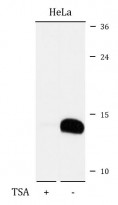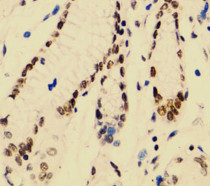ARG43027
anti-Histone H4 acetyl (Lys5) antibody
anti-Histone H4 acetyl (Lys5) antibody for ChIP,IHC-Formalin-fixed paraffin-embedded sections,Western blot and Human,Mouse,Rat
Overview
| Product Description | Rabbit Polyclonal antibody recognizes Histone H4 acetyl (Lys5) |
|---|---|
| Tested Reactivity | Hu, Ms, Rat |
| Tested Application | ChIP, IHC-P, WB |
| Host | Rabbit |
| Clonality | Polyclonal |
| Isotype | IgG |
| Target Name | Histone H4 |
| Antigen Species | Human |
| Immunogen | Synthetic acetylated peptide around Lys5 of Human Histone H4 (NP_001029249.1). |
| Conjugation | Un-conjugated |
| Alternate Names | H4; H4/n; H4C1; H4C2; H4C3; H4C4; H4C5; H4C6; H4C8; H4C9; H4F2; H4FN; FO108; H4-16; H4C11; H4C12; H4C13; H4C15; HIST2H4; HIST2H4A |
Application Instructions
| Application Suggestion |
|
||||||||
|---|---|---|---|---|---|---|---|---|---|
| Application Note | * The dilutions indicate recommended starting dilutions and the optimal dilutions or concentrations should be determined by the scientist. | ||||||||
| Positive Control | HeLa |
Properties
| Form | Liquid |
|---|---|
| Purification | Affinity purified. |
| Buffer | PBS (pH 7.3), 0.02% Sodium azide and 50% Glycerol. |
| Preservative | 0.02% Sodium azide |
| Stabilizer | 50% Glycerol |
| Storage Instruction | For continuous use, store undiluted antibody at 2-8°C for up to a week. For long-term storage, aliquot and store at -20°C. Storage in frost free freezers is not recommended. Avoid repeated freeze/thaw cycles. Suggest spin the vial prior to opening. The antibody solution should be gently mixed before use. |
| Note | For laboratory research only, not for drug, diagnostic or other use. |
Bioinformation
| Database Links | |
|---|---|
| Gene Symbol | H4C14 |
| Gene Full Name | H4 clustered histone 14 |
| Background | Histones are basic nuclear proteins that are responsible for the nucleosome structure of the chromosomal fiber in eukaryotes. This structure consists of approximately 146 bp of DNA wrapped around a nucleosome, an octamer composed of pairs of each of the four core histones (H2A, H2B, H3, and H4). The chromatin fiber is further compacted through the interaction of a linker histone, H1, with the DNA between the nucleosomes to form higher order chromatin structures. This gene is intronless and encodes a replication-dependent histone that is a member of the histone H4 family. Transcripts from this gene lack polyA tails; instead, they contain a palindromic termination element. This gene is found in a histone cluster on chromosome 1. This gene is one of four histone genes in the cluster that are duplicated; this record represents the centromeric copy. [provided by RefSeq, Aug 2015] |
| Function | Core component of nucleosome. Nucleosomes wrap and compact DNA into chromatin, limiting DNA accessibility to the cellular machineries which require DNA as a template. Histones thereby play a central role in transcription regulation, DNA repair, DNA replication and chromosomal stability. DNA accessibility is regulated via a complex set of post-translational modifications of histones, also called histone code, and nucleosome remodeling. [UniProt] |
| Cellular Localization | Nucleus. Chromosome. [UniProt] |
| Calculated MW | 11 kDa |
Images (2) Click the Picture to Zoom In
-
ARG43027 anti-Histone H4 acetyl (Lys5) antibody WB image
Western blot: HeLa cells were untreated (-) or treated (+) by TSA (1 µM) for 18 hours. 25 µg of cell lysates stained with ARG43027 anti-Histone H4 acetyl (Lys5) antibody at 1:1000 dilution.
-
ARG43027 anti-Histone H4 acetyl (Lys5) antibody IHC-P image
Immunohistochemistry: Paraffin-embedded Human stomach tissue stained with ARG43027 anti-Histone H4 acetyl (Lys5) antibody at 1:100 dilution.







